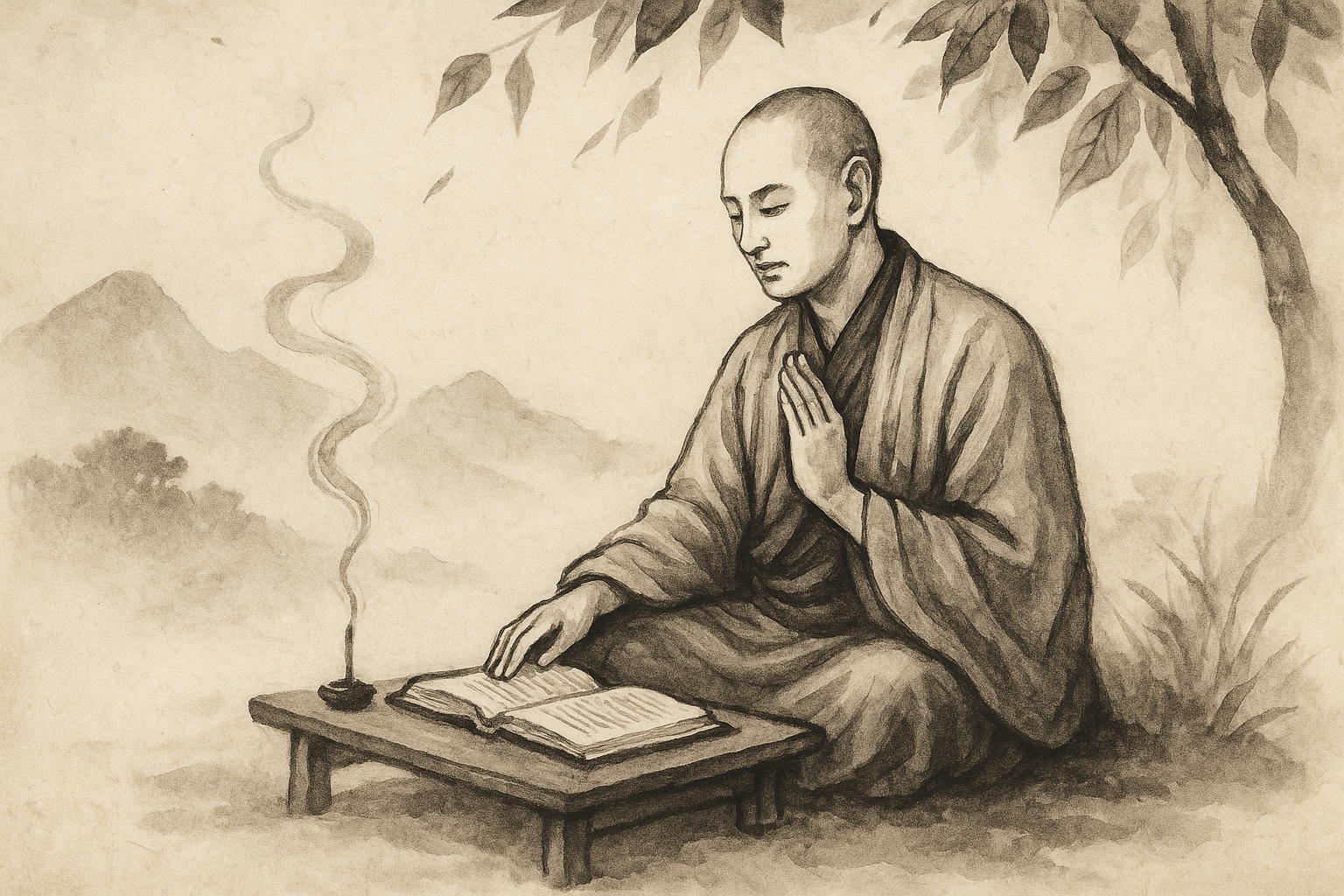Program Curriculum
Program Structure
Our curriculum follows Guy Newland's "Introduction to Emptiness," which serves as a gateway to understanding Tsongkhapa's Great Treatise on the Stages of the Path. Each month, we explore one chapter through interactive sessions that balance conceptual understanding with experiential practice.
Sessions are designed to facilitate deep shared exploration rather than lecture-style presentations. We emphasize the connection between philosophical understanding and meditation practice, ensuring that teachings are relevant to your Vajrayana practice.
Each 2-hour monthly session includes:
- Opening practice and motivation setting
- Exploration of key concepts from the chapter
- Experiential components and analytical meditation
- Small group discussions in breakout rooms
- Integration of insights and practical applications

Program Overview
Our curriculum is carefully structured to guide you through Tsongkhapa's systematic presentation of emptiness. Each month builds upon the previous, creating a comprehensive understanding of this profound topic.
Month 1: How to Be Free
Saturday, June 7th, 2025 | Welcome Coffee: 11:00 AM - 11:45 AM | Session: 12:00 PM - 2:00 PM
Based on Great Treatise, Volume 2
We begin our journey by exploring how suffering arises from not knowing ourselves. We cling to a sense of being substantial, solid, independent, and autonomous, which leads to harmful actions and perpetuates samsara.
Key Points:
- The relationship between our conception of self and suffering
- How clinging to a solid, independent self leads to harmful actions
- Emptiness as the path to freedom from suffering
Experiential Focus: Identifying moments of clinging to a solid self in daily experience and noticing the connection between this clinging and emotional reactions.
Month 2: Following the Path of Wisdom
Saturday, July 12th, 2025 | Discussion: 11:00 AM - 11:45 AM | Session: 12:00 PM - 2:00 PM
Based on Great Treatise, Volume 3, Chapters 7-9
We explore the process of identifying fundamental misconceptions and using logical analysis in meditation to realize emptiness. We learn to locate the sense of self that is the root of cyclic misery.
Key Points:
- The process of identifying fundamental misconceptions
- Using logical analysis in meditation
- The certainty that arises from realizing emptiness
Experiential Focus: Guided analytical meditation to locate the sense of self and exploring the feeling of "I" in various situations.
Month 3: Our Choices Matter
Saturday, August 2nd, 2025 | Discussion: 11:00 AM - 11:45 AM | Session: 12:00 PM - 2:00 PM
Based on Great Treatise, Volume 3, Chapters 10-11
We learn that it is not enough to withdraw the mind from mistaken ideas by placing it in a thoughtless condition. This leaves the roots of ignorance intact. We must introspectively identify the conception of an essential self and then use analysis to refute it.
Key Points:
- Active analysis vs. other forms of meditation
- Precision in refutation - neither too little nor too much
- The danger of refuting too much, which undermines ethics and leads to nihilism
- The compatibility of emptiness and dependent arising
Experiential Focus: Identifying reifying tendencies in real-time and exploring how our choices shape our experience.
Month 4: Ultimate and Conventional Radio
Saturday, September 6th, 2025 | Discussion: 11:00 AM - 11:45 AM | Session: 12:00 PM - 2:00 PM
Based on Great Treatise, Volume 3, Chapters 12 and 14
We explore the Buddha's invitation to analyze conceptions of person and self. We learn that there is nothing that can bear ultimate analysis. Everything, when interrogated as to the ultimate conditions of its nature, is found to be empty.
Key Points:
- The relationship between ultimate and conventional truth
- How emptiness and dependent arising are compatible
- The role of language in understanding reality
- Conventional existence despite ultimate emptiness
Experiential Focus: Contemplating the two truths in everyday objects and exploring conventional language while aware of ultimate emptiness.
Month 5: Reliable Sources
Saturday, October 4th, 2025 | Discussion: 11:00 AM - 11:45 AM | Session: 12:00 PM - 2:00 PM
Based on Great Treatise, Volume 3, Chapters 13, 15, and 24
We discuss Tsongkhapa's approach to studying scriptures and classical treatises. We explore how his close reading and analysis led to his understanding of emptiness.
Key Points:
- The role of scripture and reasoning in understanding emptiness
- How Tsongkhapa approached textual study
- Balancing faith and critical inquiry
Experiential Focus: Contemplating the reliability of different sources of knowledge and exploring how we come to trust certain sources.
Month 6: Ultimate Reality Exists Conventionally
Saturday, November 8th, 2025 | Discussion: 11:00 AM - 11:45 AM | Session: 12:00 PM - 2:00 PM
Based on Great Treatise, Volume 3, Chapters 15-16
We explore how emptiness—the absence or lack of intrinsic nature—exists. We discuss how absences can be important and impactful, using the example of the absence of an elephant in a classroom.
Key Points:
- How emptiness itself exists
- The importance of absences
- Avoiding nihilistic misinterpretations
Experiential Focus: Contemplating the existence of absences and exploring how emptiness affects but doesn't negate conventional reality.
Month 7: Intrinsic Nature
Saturday, December 6th, 2025 | Discussion: 11:00 AM - 11:45 AM | Session: 12:00 PM - 2:00 PM
Based on Great Treatise, Volume 3, Chapters 16-17
We examine how Madhyamikas use reason to refute intrinsic nature. We explore arguments against intrinsic nature based on dependence and change.
Key Points:
- Arguments against intrinsic nature
- The relationship between emptiness and dependent arising
- Common misunderstandings about emptiness
Experiential Focus: Analyzing objects for intrinsic nature and contemplating change and dependence in everyday phenomena.
Month 8: The Two Types of Madhyamaka
Saturday, January 10th, 2026 | Discussion: 11:00 AM - 11:45 AM | Session: 12:00 PM - 2:00 PM
Based on Great Treatise, Volume 3, Chapters 17-20
We contrast different views on how our senses relate to reality. We discuss Tsongkhapa's position on the validity of conventional perception while acknowledging ultimate emptiness.
Key Points:
- Different approaches within Madhyamaka philosophy
- Tsongkhapa's unique position on conventional validity
- The relationship between perception and reality
Experiential Focus: Exploring the reliability and limitations of sensory perception and contemplating how conceptualization shapes experience.
Month 9: Who Am I, Really?
Saturday, February 7th, 2026 | Discussion: 11:00 AM - 11:45 AM | Session: 12:00 PM - 2:00 PM
Based on Great Treatise, Volume 3, Chapters 21-22
We use Alice in Wonderland as an analogy for questioning identity. We explore the fundamental question of personal identity and selfhood.
Key Points:
- The puzzle of personal identity
- How the self both exists conventionally and lacks intrinsic nature
- Implications for understanding others
Experiential Focus: Deep inquiry into the nature of personal identity and exploring the feeling of "I" across different states and roles.
Month 10: From Analysis to Insight
Saturday, March 7th, 2026 | Discussion: 11:00 AM - 11:45 AM | Session: 12:00 PM - 2:00 PM
Based on Great Treatise, Volume 3, Chapters 25-27
We emphasize Tsongkhapa's insistence that nondualistic insight must be founded on careful analysis. We discuss how a bodhisattva's insight is analytical and differentiating.
Key Points:
- The relationship between analysis and insight
Experiential Focus: Reflecting on the journey through the program and integrating insights into daily life.

